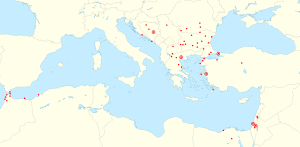lingvo.wikisort.org - Language
Haketia (Hebrew: חַכִּיתִּיָה; Arabic: حاكيتيا; Spanish: Haquetía) (also written as Hakitia or Haquitía) is an endangered Jewish Romance language also known as Djudeo Spañol, Ladino Occidental, or Western Judaeo-Spanish. It was historically spoken by the North African Sephardim[2] in the Moroccan cities of Tétouan, Tangier, Asilah, Larache, Chefchaouen, Ksar el-Kebir, and the Spanish towns of Ceuta and Melilla. Tetuani Ladino was also spoken in Oran, Algeria. One of the distinctions between Ladino and Haketia (Haquetia) is that the latter incorporates Arabic.
This article needs additional citations for verification. (March 2010) |
| Haketia | |
|---|---|
| Hakitia, Haquitía, Western Judeo-Spanish | |
 An original letter in Solitreo script from Tangier, written in 1832. | |
| Native to | North Africa |
| Region | Israel, Amazonas state in Brazil[1] |
| Ethnicity | North African Sephardic Jews |
Language family | Indo-European
|
Early forms | |
| Dialects | |
| Language codes | |
| ISO 639-3 | – |
| IETF | lad-015 |
 Historical Judeo-Spanish speech communities in the Mediterranean. Ringed circles represent modern speech communities. Haketia is spoken on the southwest Mediterranean. | |
| Part of a series on |
| Jews and Judaism |
|---|
|
|
Description
The well-known form of Judaeo-Spanish spoken by Jews living in the Balkans, Greece, Turkey and Jerusalem is Ladino Oriental (eastern Ladino). Haketia may be described by contrast as Ladino Occidental. The language is a variety of Spanish that borrows heavily from Judeo-Moroccan Arabic. It evidently also contains a number of words of Hebrew origin and was originally written using Hebrew letters. There is some cultural resemblance between the two Judaeo-Spanish dialect communities, including a rich shared stock of romanzas (ballads) from medieval Spain, though both words and music often differ in detail (as indeed they do between one Oriental-Sephardic community and another).
The name "Haketia" derived from the Arabic حكى ḥaká, "tell",[3] and is therefore pronounced with IPA: [x], reflecting the Arabic ḥāʾ ح. In some places it is written "Jaquetía" with the same pronunciation.
Haketia is considered to have influenced Llanito, the vernacular spoken in the British overseas territory of Gibraltar due to migration of Moroccan Jews.
Modern use
Haketia, unlike other varieties of Judaeo-Spanish, did not develop a literary tradition, so the language remained as a colloquial form of communication and was not used as a vehicle for formal education since in Spanish Morocco, Spanish was used, along with French, at the Alliance Israélite Universelle schools. Due to the influence of the Spanish and French conquests and the large number of Jews from northern Morocco who emigrated to Venezuela, Spain and later Argentina, the language was levelled with modern Spanish, which has contributed greatly to its extinction. Nevertheless, there has been a slow renaissance of the language, helped by musicians such as Doris Benmaman, Mor Karbasi and Kol Oud Tof Trio, among others. Jose Benoliel and Alegría Bendayán de Bendelac have both compiled Spanish-Haketía[4] dictionaries, published in 1977 and 1995, respectively. The Caracas Center of Sephardic Studies regularly publishes articles in Haketia in its magazine Maguen-Escudo.[5] The language is also spoken in some communities in the Amazon areas of Brazil.[6]
References
- Cunha (2009), p. 11.
- La Haketia
- Benoliel, José (1977). Dialecto Judeo-hispano-marroquí o Hakitía. Madrid. OCLC 5982985.
- Haketía: El Djudeo-Espagnol de la Afrika del Nord
- Moreno, Aviad (14 October 2016). "Maguén-Escudo". Encyclopedia of Jews in the Islamic World.
- Cunha, Álvaro (2012). Hakitia: o judeu-árabe na Amazônia. São Paulo: Sapientia.
Bibliography
- Cunha, Álvaro (2009). Introdução à fonologia da hakítia (Master's dissertation). São Paulo: University of São Paulo. doi:10.11606/D.8.2009.tde-29032010-140949.
External links
- List of articles written in Haketia at eSefarad.com
- Rodrigues-da-Cunha, Alvaro Fernando (2012): Narrativa na (língua judaico-marroquina) hakitía (Portuguese summary)
Другой контент может иметь иную лицензию. Перед использованием материалов сайта WikiSort.org внимательно изучите правила лицензирования конкретных элементов наполнения сайта.
WikiSort.org - проект по пересортировке и дополнению контента Википедии

